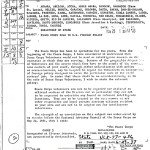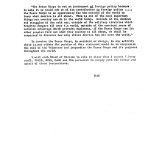Dean Rusk’s Directive to all Embassies: Do Not Involve Peace Corps Volunteers
Dean Rusk, Secretary of State during the Kennedy Administration, spelled out the role of the Peace Corps in Foreign Policy in this directive.This Airgram went out to all embassies in the Third World. The actual document was scanned by the Research Staff at the JFK Library and received February 3, 2015. The document comes from National Security Files, Box 284, Peace Corps: General, 1/63-3/63. Here are scans of the original document.
Side 1 – click for larger image
.
Side 2 – click for larger image
The actual text in the scan of the original document is hard to read when it is reproduced. I have typed this text from that scan of the original copy, as follows:
From: DEPARTMENT OF STATE
Date: March 25, 1963
SUBJECT: PEACE CORPS ROLE IN U. S. FOREIGN POLICY
The Peace Corps has been in operation for two years. From the beginning of the Peace Corps, I have considered it understood that Peace Corps Volunteers would not be used as intelligence sources on the countries in which they are serving. Because of the geographic dispersion of Volunteers and the access which they have to the people of the country, some members of your staff, through either unfamiliarity with policy or overzealousness, may be tempted to regard the Volunteers as instruments of foreign policy designed to served the particular ends of the staff members’ job. In order that there shall be no misunderstanding as to the role of Peace Corps Volunteers, I wish to state the relevant policy:
“Peace Corps volunteers are not to be regarded nor utilized as official members of the Mission and in particular they are not to be requested to undertake any formal or informal intelligence functions. They are to be treated in the same manner as are other responsible and loyal private American citizens resident in your area and are not to be singled out for intelligence interviews.”
The strength of my conviction on this subject was underscored by my remarks before the National Advisory Council of the Peace Corps on May 22, 1961, when I said:
“The Peace Corps is not an instrument of foreign policy because to make it so would rob it of the contributions to foreign policy…..the Peace Corps is an opportunity for the nations of the world to learn what America is all about. This is one of the most important things our country can do in the world today. Outside of the shadows and struggles of the cold war, outside of the military rivalries which heighten dangers all over the world, outside of the constant sense of national advantage which pervades diplomacy, if the Peace Corps can let other peoples find out what this country is all about, we shall be surprised to discover how many allies America has all over the world.”
To involve the Peace Corps, by accident or design, in any activity which is not within the purview of this statement would be to compromise the role of the Volunteer and jeopardize the Peace Corps and its purpose throughout the world.
I wish each Chief of Mission to make it clear that I expect Embassy staff, USAID, USIS, MAAG, and CIA personnel to comply with the letter and spirit of these instructions.
RUSK
Thank you to Marian Beil Haley for preparing and placing the scans of the original document so it could be viewed on Peace Corps Worldwide. Thank you to Corbin Apkin; Textual Archives Reference; John F. Kennedy Presidential Library for researching this important document and scanning it.
I first found the specific reference to this policy directive by Secretary Rusk in THE BOLD EXPERIMENT JFK’s Peace Corps. By Gerard T. Rice. Illustrated. 349 pp. Indiana: University of Notre Dame Press. 1985.
Finally, far too belated but still heartfelt, thank you to the late Secretary of State Dean Rusk for his eloquent statement of this banner policy protecting the integrity and independence of Peace Corps.


Now there is a bit of ancient history, an “Airgram.”